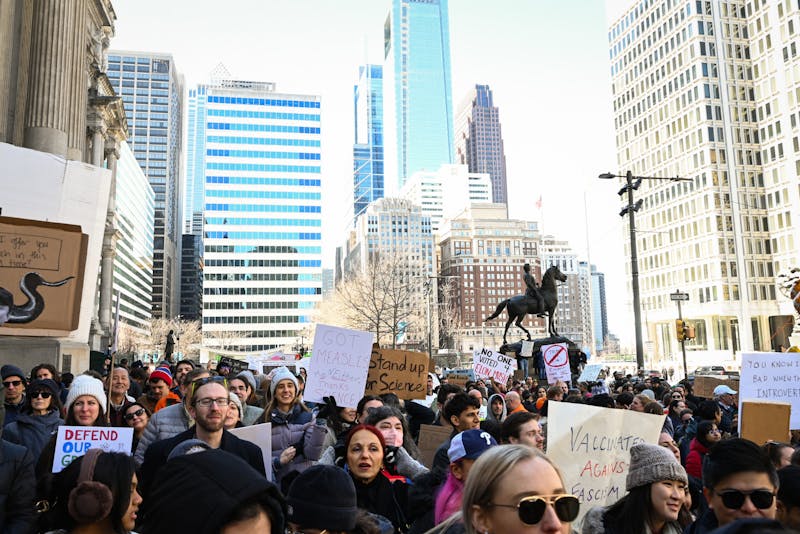
Candidates and super PACs have spent over $81 million in the Pennsylvania senatorial race, making it one of the most competitive. | Courtesy of Gage Skidmore/Wikimedia Commons
Credit: Carson Kahoe | Photo EditorWith only two weeks until Election Day, most major polls are showing Democratic presidential nominee Hillary Clinton as the strong favorite for president. But for Pennsylvania, the results voters can expect on Nov. 8 are still anyone’s guess.
The senatorial race between Democratic candidate Katie McGinty and incumbent Sen. Pat Toomey (R-Pa.) is one of the closest in the country, and for good reason — it could be the deciding factor in whether Democrats flip the Senate or Republicans maintain control.

The Philadelphia Inquirer reported earlier this month that $81 million have already been spent on the election — by the candidates themselves and by super PACs and other outside groups — making it by far the most expensive Senate race in the nation. With so much at stake, students at Penn have been working with both campaigns in hopes of seeing their party win in this tight contest.
Nursing School junior Erin Hartman is an intern at the McGinty campaign and hopes not only that the Democrats will retake the Senate, but that history will be made in Pennsylvania next month.
“The fact that she is a woman is important to me,” Hartman said. “There’s never been a female senator from the state of Pennsylvania, so she’s trying to shatter that glass ceiling.”
Following the release of the now infamous tapes where Republican presidential nominee and 1968 Wharton graduate Donald Trump referred to grabbing a woman “by the p**sy,” Hartman helped the McGinty campaign produce a commercial in which Hartman and other women voiced their responses to Trump’s comments.
“I said that I was deeply, personally offended by Trump’s comments,” Hartman said, “and that it should deem him unqualified to run for president.”
The ad, which has been running in central Pennsylvania, was meant as a criticism of Toomey, who has been decidedly vague on his opinion of Trump. Much of the $81 million invested into this election has been used to produce attack ads targeting each candidate.
For Wharton junior Sean Egan, the founder and head of Penn for Toomey, these ads have been a nasty reality of this election.
“If you turn on the TV anytime around here, you’ve seen it — attack ad after attack ad,” Egan said. “You’ve got to think they just cancel each other out.”
The work Egan and Penn for Toomey have put into the election has been entirely grassroots: flyering on Locust, canvassing door-to-door and phone-banking, often in conjunction with the College Republicans.
These locally-focused efforts may be in vain on Penn’s highly liberal campus, which is situated in Philadelphia’s Ward 27. The ward voted 84 percent for the Democratic candidate, Sen. Bob Casey (D-Pa.), in the state’s last senatorial election in 2012.
In hopes of repeating these numbers, McGinty’s campaign has put focus into bringing out voters on college campuses in Philadelphia. Earlier this semester, McGinty appeared with Casey and Sen. Elizabeth Warren (D-Ma.) at the Penn Museum, for a series of speeches hosted by the Penn Democrats.
Jana Korn, a College junior and the current president of Penn Democrats, introduced Casey at the event.
“To be even a small part of that event was really special,” said Korn, who is also an intern for the McGinty campaign.
Like Hartman, Korn is excited by the prospect of electing Pennsylvania’s first female senator, and by the possibility of flipping the Senate. In her eyes, it’s imperative that Clinton not be road-blocked by Congress when coming into office.
“Since the Senate has been Republican-controlled, it has served as a force of obstruction to the progress President Obama has been trying to make,” Korn said.
Egan said, however, that a Republican-controlled Senate is exactly what is needed if Clinton wins the election .
“If [Clinton] were to be elected to the presidency, as a candidate that people are really voting for just because they don’t like their alternatives, I think people are going to want a check on [her] power,” Egan said. “I think that check could come in majorities in Congress.”
What Egan and Korn both agree on, however, is that the Pennsylvania senatorial race is going to stay heated until the last vote is cast.
“As always, it just comes down to voter turnout on Election Day,” Egan said.
The Daily Pennsylvanian is an independent, student-run newspaper. Please consider making a donation to support the coverage that shapes the University. Your generosity ensures a future of strong journalism at Penn.
Donate






